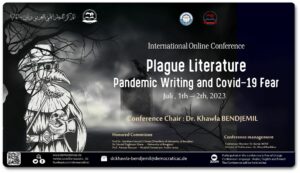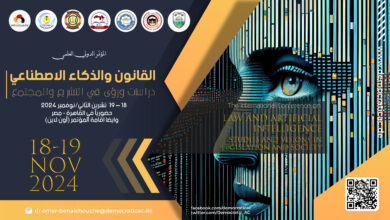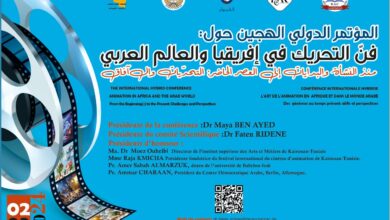Plague Literature: Pandemic Writing and Covid-19 Fear

The #Democratic_Arabic_Center based in Germany – Berlin, is pleased to announce the First International Online Conference on
Plague Literature: Pandemic Writing and Covid-19 Fear
1- 2 / 07 / 2023
In collaboration with
The University of Benghazi – Libya
Conference Chair : Dr. Khawla BENDJEMIL
President of the Scientific Committee – Prof. Dr : Fouad BOULKROUN –University Centre Abdelhafid Boussouf, Mila, Algeria
Honored Committee
- Prof Dr . Azeldeen Younis El-Dressi (President of University of Benghazi
- Dr. Youssif Zaghwani Omar – University of Benghazi
-
Prof . Ammar Sharaan – Head of Democratic Arabic Cente
Conference management
- Conference Director: Dr. Karim AICHE
- Director of Publication : Dr. Ahmed Bohko
The Scope of the Conference
The current coronavirus disease (COVID-19) pandemic has caused fear, stress, and anxiety among adults and children. However, learning that the outbreaks of infectious diseases, including smallpox, typhus, Spanish flu, and others is not new to humanity may be somewhat relaxing. Human sciences in general and literature in particular have always written about and responded to plagues and pandemics as early as Athenian Thucydides. This latter described The Plague of Athens (429-426 BCE) in a section in his narrative, History of the Peloponnesian War for “people to study in case it should ever attack again, to equip themselves with foreknowledge so that they shall not fail to recognize it” (Grant 77). Thucydides was not actually mistaken because epidemics and pandemics are actually still a reality for humanity. Actually from the time of Thucydides to Camus, the good news to know for sure is that pandemics do end. Here comes the role of Plague Literature, which exploits the joke that plagues and infectious diseases are made out of the countless human attempts to stop them. This kind of literature is indeed what humans need. This is because during plague and pandemic years, “we need less propaganda and more poetry” (Virginia Heffernan)
Plagues continue to threaten and kill humans and literature continues to chronicle plagues’ chaos and horror
In literature, the term ‘plague’ is used to designate any infectious epidemic that threatens humans and social order. Although the current coronavirus disease (COVID-19) is referred to as a‘pandemic’, it is also regarded as a plague. The outburst of coronavirus pandemic conjures up images of chaos, death, and loss in literary works that depict plagues. The Great Plague of Marseille in 1720 fired the imagination of Daniel Defoe and gave birth to his A Journal of the Plague Year in 1722 that dealt with the London outbreak of 1664–’65. In Defoe’s work, Mary Shelley’s The Last Man (1826), Edgard Allen Poe’s “The Masque of the Red Death” (1842) Albert Camus’s The plague (1947), and Gabriel García Márquez’s Love in the Time of Cholera (1985) plague is not merely a medical disease. On writing about plagues, Susan Sontag argues, “feelings about evil are projected onto a disease”. Plagues have haunted the imagination of writers who saw them as a fertile theme to promote or oppose social, political, and cultural issues. Plague can be a metaphor for an unhealthy country or evil individuals. It can also be portrayed as either God’s punishment or the outcome of man’s destruction of nature. Plague literature helps humans transcend the literal form of the plague and connect it with the inner self to face its darkest secrets
Plague Literature can be portrayed through Disaster fiction and Catastrophe narratives which define the recent time apocalypse that might be a natural disaster, a scientific mistake or a killing virus which brings humanity and the writers’ imagination into a final doomsday. Corona Virus lockdown is a new challenging setting for today’s plague literature. Thence, many authors like the British Naomi Alderman preferred to stop writing her pandemic novels like The Survivals that she started in 2017 and shifted her narrative objective to Corona virus circumstances questioning human aspects like family relationships, character romance ties and social meetings
This conference will also be a zoom-in into the difference between the pre-covid and the post-covid fictions highlighting the revision of the various literary concepts such as life and death, cure and character survival, and religious doctrine and belief. Furthermore, the event will be a discussion of the Pandemic as a literary theme that may restructure today’s arts and reshape literary writing. It can even question literature’s classic function in alleviating the readers’ historical fear and narrative tension. Can today’s pandemic/plague literature offer a narrative relief or imaginary escape for its audience or does it just stress the catastrophe casting humanity into the unknown
Main Tracks
- Plague literature
- History in shaping plague literature
- Social and political consequences of plagues
- The pandemic impact on popular culture
- The liberating aspect of plagues
- Apocalyptic narratives
- Plague and psychoanalysis
- Zombie genre
- The body metaphor
- Thriller fiction in the pandemic and narrative self-isolation
- Catastrophe literature
- Futuristic literature and the vaccine promise
- The challenge of contemporary romance in the pre-Covid and post-Covid literatures
Scientific Committee
- Prof. Fouad MAMI – University of Ahmed Draya, Adrar, Algeria
- Prof. Helena GURFINKEL- Southern Illinois University of Edwardsville, USA
- Prof. Salah BOUREGBI – University of Badji Mokhtar, Annaba, Algeria
- Prof. Samira KHAWALDEH – University of Jordan, Amman, Jordan
- Prof. Stephen TAMARI- Southern Illinois University of Edwardsville, USA
- Dr. Mohamed KOUDDED – Kasdi Merbah University,Ouargla, Algeria
- Dr. Aziz ASKITOU-Multidisciplinary Fac of Nador, Mohamed First University,Morocco
- Dr. Badriah KHALEEL – Kinnaird College for Women University, Lahore, Pakistan
- Dr. Christopher HILL -The British University in Dubai, Dubai, UAE
- Dr. Khawla BENDJEMIL – 8 May, 1945 University, Guelma, Algeria
- Meriem BOUREGAA – 8 May, 1945 University, Guelma, Algeria
- Dr. Nassima KAID – University of Djillali Liabes, Sidi Bel Abbès, Algeria
- Dr. Nadjiba BOUALLEGUE – 8 May, 1945 University, Guelma, Algeria
- Dr. Samir ARAB – Hassiba Benbouali University, Chlef, Algeria
- Dr. Sara ABDERRAZAG – Mustapha Stambouli University, Mascara, Algeria
- Dr. Şule ÖZÜN – Süleyman Demirel University, Isparta, Turkey
Organizing Committee
Members (Teachers)
- Asma ZEMMITI- 8 May, 1945 University, Guelma, Algeria
- Amina ELLAGOUNE- 8 May, 1945 University, Guelma, Algeria
- Hadjer Boumaza-Ecole Supérieure de Technologies Industrielles (ESTI), Annaba, Algeria
- Mahfoud ALIZOUI- 8 May, 1945 University, Guelma, Algeria
- Mourad ATY- 8 May, 1945 University, Guelma, Algeria
- Meriem CHERIET- 8 May, 1945 University, Guelma, Algeria
- Mounya ABDAOUI – 8 May, 1945 University, Guelma, Algeria
- Naziha BENKAMOUCHE- 8 May, 1945 University, Guelma, Algeria
- Radia LAYADA- 8 May, 1945 University, Guelma, Algeria
Members (MA & PhD Students)
- Ali Djazil ZIOUCH – 8 May, 1945 University, Guelma, Algeria
- Ayşegül GENÇ – Ankara University, Ankara, Turkey
- Aymen MESBAHI – 8 May, 1945 University, Guelma, Algeria
- Halima BENZDIRA – Manchester Metropolitan University, Manchester, UK
- Hamdi TOBBA – University of Pitesti, Pitesti, Romania
- Imad ADJABI – University of Warsaw, Warsaw, Poland
- Kenza BENSEGHIR – Paris-Saclay University, Saclay, France
- Leyla BOUALEGUE – University of Essex, Essex, UK
- Meriem HENNAD – 8 May, 1945 University, Guelma, Algeria
- Roqiya BOUGUERRA – Eötvös loránd University, Budapest, Hungary
- Soumia BOUMAZA – Canterbury Christ Church University, Canterbury, UK
- Yehya BEZAZI – 8 May, 1945 University, Guelma, Algeria
Important Notes
- Conference Language : English
- The Conference will be held online
Abstract Submission Guidelines
- Please submit your abstract (200-250 words) with a brief biography
- The collection of the final manuscripts will be peer-reviewed and published both in a collective book and the International Journal of Scientific Conferences
Important Dates
- Abstracts Submission: 25 May, 2023
- Notification of Acceptance: 10 June, 2023
- Full Paper Submission: 10 July, 2023
- Conference Dates: 1-2 July, 2023
Keynote Speakers
The following scholars have kindly agreed to participate in the conference and deliver plenary talks
Prof Dr . Scott Slovic
March 2023 bio
Scott Slovic is University Distinguished Professor of Environmental Humanities at the University of Idaho, USA. He served as the founding president of the Association for the Study of Literature and Environment (ASLE) in the early 1990s, and from 1995 to 2020 was the editor-in-chief of ISLE: Interdisciplinary Studies in Literature and Environment. The author, editor, or co-editor of thirty books, his recent publications include Nature and Literary Studies (Cambridge University Press, 2022) and The Bloomsbury Handbook to the Medical-Environmental Humanities (Bloomsbury Academic, 2022). He currently co-edits the book series Routledge Studies in World Literatures and the Environment and Routledge Environmental Humanities. He lives in Eugene, Oregon
David Quammen
David Quammen is an American author and journalist whose seventeen books include The Song of the Dodo (1996), The Reluctant Mr. Darwin (2006), and The Tangled Tree (2018). His most recent book, Breathless (2022), is a narrative of the scientific efforts to trace the origins and evolution of the Covid-19 virus, SARS-CoV-2, and to combat the pandemic it caused. Breathless was a finalist for the National Book Award in Nonfiction. Quammen’s 2012 book, Spillover, had earlier explored the subject of novel pathogens (including viruses) that spill over from wild animals and infect humans; it predicted a global disease event, a pandemic, that would begin from a wild animal, possibly at a market in China, and possibly caused by a coronavirus. His forthcoming book (May 2023) is The Heartbeat of the Wild: Dispatches from Landscapes of Wonder, Peril, and Hope, drawn from twenty years of assignments for National Geographic magazine and knit together with new material. Quammen’s magazine work has also appeared in The New Yorker, The Atlantic, Outside, Harper’s, Rolling Stone, and The New York Review of Books, among other magazines, and his Op Eds in the New York Times, the Washington Post, and other newspapers. He’s a three-time recipient of the National Magazine Award and has received several awards for his books, including the Premio Letterario Merck, in Rome. He shares a home in Bozeman, Montana, with his wife, Betsy Gaines Quammen, author of the book American Zion, plus three borzois, a cross-eyed cat, and a rescue python.
Professor Maggie Gee
Professor Maggie Gee’s seventeenth novel, The Red Children, a fable about climate change where a mutating virus sharpens the divisions between human beings, will be published in April 2022, together with a 20th anniversary edition of The White Family(2002),her novel about the origins of racism (shortlisted for the International Impac and Women’s Prize) with a foreword by Booker Prize-winner Bernardine Evaristo.She has published16 books, including The Ice People, My Cleaner, and most recently Blood (2019), one of the Sunday Times’s ‘Best Literary Novels 2019’ (Hilary Mantel: ‘An astonishing book. Funny and fierce, written with style and dash, without fear.’) She has been translated into 15 languages and has been warning against climate change in her fiction since Where Are the Snows (1991). In her novel The Flood (2004), extensive flooding is followed by a water-born virus, ‘flood sickness’. In 2012 there was an international conference about Gee’s work at St Andrew’s University, Scotland. In 2014 Professor Mine ÖzyurtKiliç’s book Maggie Gee: Writing the Condition of England Novel was published by Bloomsbury Academic. She is Professor of Creative Writing at Bath Spa University and a Vice-President of the Royal Society of Literature
Publishing Rules
- Research paper should be written either in English – French as it is necessary to consider the clarity and integrity of the text and avoid grammatical, spelling and linguistic errors
- The research paper should not include less than 4000 words and should not exceed 8000 words
- The research paper should be characterized by objectivity, novelty and scientific accuracy, as they should not be taken from a previous study, article, dissertations or theses
- Papers should not be published previously in any form
- Researchers have to adopt the scientific standards in their research studies
- References should appear at the end of each page as follows
- For Books: Full Name of Author, Book’s Title, Volume/issue, Place of Publication: Publishing House, Edition, Publishing Year, Page
- For articles: full name of the author, “title of the article”, journal title, place of publication, issue, date of publication, page
- For web sites: full name of author, “title of article”, article link, date of publication, date of access to the site
- The researcher should send a brief biography with the article
- Research Papers should be sent in the form of a Microsoft word to the following email
dr.khawla-bendjemil@democraticac.de
- The researcher should sign a pledge that the article has not been published in any form hard copy or electronically, and not submitted for publication to any other party
- The researcher will be informed of the initial acceptance or rejection of the research
- The scientific committee reads and reviews confidentially the submitted research articles
- Ther reviewers’ remarks will be sent to the researcher. If the article is accepted for publication but needs some modifications, the writer should make the required modifications within ten days of being notified of the decision of the committee
- The scientific committee may make some necessary modifications to the submitted material for publication without changing its contents
- The materials published in the journal reflect the views of the authors and do not necessarily represent the opinion of the journal
- Any research or article that does not meet the conditions will not be taken into consideration and will not be published regardless of its scientific value
- The articles sent to the Journal require the following specifications
- Page margins should be as follows: Top 02, Bottom 02, Right 02, Left 02, Header Sheet 5, Bottom Sheet 1.5
- Title of the article: font: Times New Roman, Size: 16
- Full name of researcher: (font style: Times New Roman ont size: 13)
- Degree of researcher (font style: Times New Roman size: 13)
- Foundation of full affiliation and country (font style: Times New Roman size: 13)
- E-mail of the researcher (font style: Times New Roman font size: 12)
- Abstract: The abstract should not exceed 200 words and not less than 150 words (Font: Times New Roman size: 13, italics)
- Key words: (Between 05 and 08 words, Font: Times New Roman, Size: 13, Italics)
- The Introduction should include the following components: Introducing the topic, research questions, hypothesis or hypotheses, the importance of the study, the objectives of the study, the literature of the study (previous studies), the study curricula, the study axes. (Font style: Times New Roman size: 13 between lines: 1.5)
- For content: (font style: Times New Roman size: 13, between lines: 1.5)
- Principal Headline 1: (font style: Times New Roman size: 16, between lines: 1.5)
- First subtitle: (font style: Times New Roman size: 14, between lines: 1.5)
- Second subtitle: (font style: Times New Roman size: 14, between lines: 1.5)
- Principal Headline 2: (font style: Times New Roman size: 16, between lines: 1.5)
- First subtitle: (font style: Times New Roman size: 14, between lines: 1.5)
- Second subtitle: (font style: Times New Roman size: 14, between lines: 1.5)
- Conclusion: findings and recommendations: (font style: Times New Roman size: 13, between lines: 1.5)
- List of sources and references: (font style: Times New Roman size: 13, between lines: 1.5)
- For Times New Roman size: marginalization and referrals: at the end of pages and not in the latest article, font style size: 12, between lines: 1.0
Participation Fees
Democratic Arab Center For Strategic, Political & Economic Studies
Deutschland – BerlinContinue on the Viper-Whats App : 00491742783717





